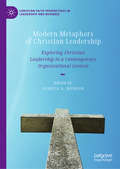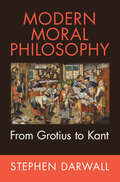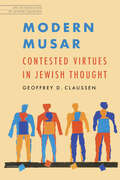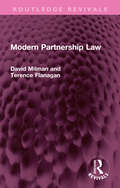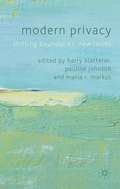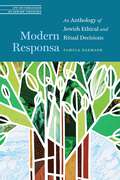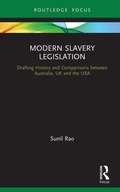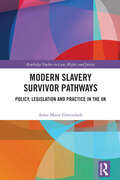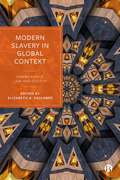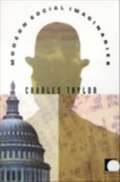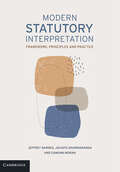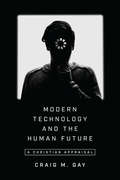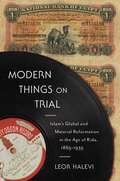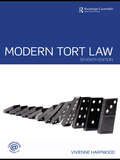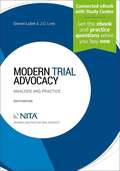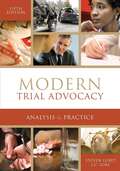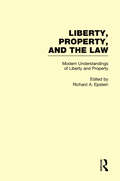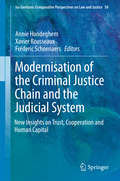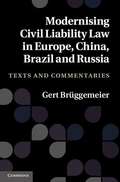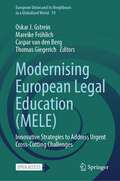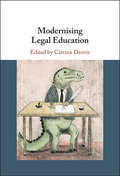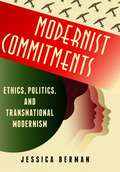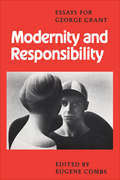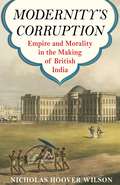- Table View
- List View
Modern Metaphors of Christian Leadership: Exploring Christian Leadership in a Contemporary Organizational Context (Christian Faith Perspectives in Leadership and Business)
by Joshua D. HensonThis book explores contemporary metaphors of leadership from a biblical or church historical perspective. It seeks to understand the cultural, social, and organizational metaphors from the Bible and the implications for contemporary organizations. Addressing issues such as communication, mentorship, administration, motivation, change management, education, and coaching, the authors explore concepts related to both for-profit and not-for-profit organizations. This book will be a valuable addition to the leadership literature in showing how biblical leadership principles can be used in contemporary organizations.
Modern Moral Philosophy: From Grotius to Kant
by Stephen DarwallIn this magisterial study, one of our leading moral philosophers refutes the charge (originally made by Elizabeth Anscombe) that modern ethics is incoherent because it essentially depends on theological and religious assumptions that it cannot acknowledge. Stephen Darwall's panoramic picture starts with the seventeenth-century thinker Grotius and tells the story continuously down to the time of Kant, exploring what was in fact a completely new way of doing ethics based on secular ideas of human psychology and universal accountability. He shows that thinkers from Grotius to Kant are profoundly united by this modern approach, and that it helped them to create a theory of natural human rights that remains of great political relevance today. He further shows that this new way of thinking provides conceptual resources that are far from exhausted, and that moral philosophy in this idiom still has a vibrant future.
Modern Musar: Contested Virtues in Jewish Thought (JPS Anthologies of Jewish Thought)
by Geoffrey D. ClaussenHow do modern Jews understand virtues such as courage, humility, justice, solidarity, or love? In truth: they have fiercely debated how to interpret them. This groundbreaking anthology of musar (Jewish traditions regarding virtue and character) explores the diverse ways seventy-eight modern Jewish thinkers understand ten virtues: honesty and love of truth; curiosity and inquisitiveness; humility; courage and valor; temperance and self-restraint; gratitude; forgiveness; love, kindness, and compassion; solidarity and social responsibility; and justice and righteousness. These thinkers—from the Musar movement to Hasidism to contemporary Orthodox, Reform, Conservative, Reconstructionist, Renewal, Humanist, and secular Jews—often agree on the importance of these virtues but fundamentally disagree in their conclusions. The juxtaposition of their views, complemented by Geoffrey Claussen&’s pointed analysis, allows us to see tensions with particular clarity—and sometimes to recognize multiple compelling ways of viewing the same virtue. By expanding the category of musar literature to include not only classic texts and traditional works influenced by them but also the writings of diverse rabbis, scholars, and activists—men and women—who continue to shape Jewish tradition, Modern Musar challenges the fields of modern Jewish thought and ethics to rethink their boundaries—and invites us to weigh and refine our own moral ideals.
Modern Muslim Marriage: Finding The Right Match And Making Your Marriage Succeed
by Sohaib Sultan Suzy Ismail Yasmin Mogahed Anas Coburn Munira EzzeldineModern Muslim Marriage: Finding the Right Match and Making Your Marriage Succeed
Modern Partnership Law (Routledge Revivals)
by David Milman Terence FlanaganFirst published in 1983, Modern Partnership Law departs from the traditionally stale treatment of the subject. The amount of effort being made to encourage small businesses has made partnership law particularly relevant. This book contains chapters on partnership finance; employees; partnerships between spouses and legal intervention in partnership law. In an attempt to move away from citing hackneyed nineteenth century English authorities on this subject, greater prominence is given to Commonwealth cases. This book should be a stimulating addition to the list of all law students.
Modern Privacy
by Harry Blatterer Pauline Johnson Maria R. MarkusModern Privacies addresses emergent transformations of privacy in western societies from a multidisciplinary and international perspective. It examines social and cultural trends in new media, feminism, law, work and intimacy which indicate that our perceptions, evaluations and enactments of privacy in constant flux.
Modern Responsa: An Anthology of Jewish Ethical and Ritual Decisions (JPS Anthologies of Jewish Thought)
by Rabbi Pamela BarmashAn original anthology of modern responsa (Jewish ethical and ritual decision-making) by rabbinic authorities, men and women, across movements (Conservative, Orthodox, Reform), geographic locales, and ethnicities (Ashkenazic, Sefardic, Mizraḥi), Modern Responsa engages readers in understanding how rabbis expert in Jewish law apply principles, precedents, and rules from Judaism&’s legal tradition to real-life issues. Responsa on ten topics—personal and business ethics, ritual, personal status, women, LGBTQIA+ people, medical ethics, the COVID-19 pandemic, relationships with the other, the modern State of Israel, and Jewish life in the United States—showcase how the rabbinic decisors who wrote them handle modern quandaries for their communities. Pamela Barmash&’s translations open up most of these original Hebrew texts to English-speaking readers for the first time. Sometimes the decisors disagree—but other times they rule similarly, despite differing ideological commitments. Clear explanations of how the decisors build their arguments along with historical background, decisor biographies, implications, and a glossary enable general adult and teen readers as well as scholars to grasp the finer points of Jewish ethical and ritual decision-making. Ultimately, Modern Responsa illuminates the dynamic nature of Jewish law, the creativity of Jewish legal writings, and the multidimensionality of the Jewish experience in modernity.
Modern Slavery Legislation: Drafting History and Comparisons between Australia, UK and the USA
by Sunil RaoThis book will aid understanding and interpretation of the Californian, UK and Australian Modern Slavery Acts, and will provide an in-depth three-way comparative analysis between the three Acts. Modern slavery is a new legal compliance issue, with new legislation enacted in California (Transparency in Supply Chains Act, 2010), the UK (Modern Slavery Act, 2015) and most recently, Australia (Modern Slavery Act, 2018). Such legislation mandates that business of a certain size annually disclose the steps that they are taking to ensure that modern slavery is not occurring in their own operations and supply chains. The legislation applies to businesses wherever incorporated or formed. Key aspects of primary focus will include lessons learned from the California, UK and Australian experience and central arguments on contentious issues, for example: monetary threshold for determining reporting entities, penalties for non-compliance, compliance lists and appointment of an Anti-Slavery Commissioner. The book will also discuss how contentious issues were ultimately resolved and will undertake a comparative analysis of the Californian, UK and Australian Acts. Modern Slavery Legislation will be of interest to academics and students of business and human rights law.
Modern Slavery Survivor Pathways: Policy, Legislation and Practice in the UK (Routledge Studies in Law, Rights and Justice)
by Anne-Marie GreensladeThis book presents a critical chronology of the modern slavery survivor journey in the UK, from intervention by the authorities to long-term recovery. The work examines the modern slavery survivor pathway and assesses the support systems available to survivors throughout this process. It also explores links to other traumatic crimes and investigates how the role of ‘witness’ in the criminal justice system impacts survivors’ experiences. The work showcases findings from interviews with frontline practitioners alongside analysis of government publications and independent reports. It emphasises the importance of holistic care pathways with a consistent, benchmark standard of support across all services, including advocacy for each individual. It further argues that the UK government needs to extend its anti-slavery efforts towards long-term support and understanding of survivor needs, which should include a focus on survivor narratives and input. It is argued that this would not only improve recovery outcomes but would advance the criminal justice process in this area through witness retention and stronger evidence. The book will be of interest to academics, researchers and policy-makers in the areas of human rights, criminal justice, social justice and victimology. Based on international legal instruments, the work will appeal to an international readership.
Modern Slavery in Global Context: Human Rights, Law, and Society
by Elizabeth A. FaulknerThis thought-provoking collection brings together academics from a range of disciplines to examine modern slavery. It illustrates how different disciplinary positions, methodologies and perspectives form and clash together through a kaleidoscopic view to contribute a unique insight into critical modern slavery studies. Providing a platform to critique the legal, ideological and political responses to the issue, experts interrogate the construct of modern slavery and the anti-trafficking discourse which have dominated contemporary responses to and understandings of exploitation. Drawing on a range of global real-world examples, this is a vital contribution to the study of modern slavery.
Modern Social Imaginaries
by Charles TaylorOne of the most influential philosophers in the English-speaking world, Charles Taylor is internationally renowned for his contributions to political and moral theory, particularly to debates about identity formation, multiculturalism, secularism, and modernity. In Modern Social Imaginaries, Taylor continues his recent reflections on the theme of multiple modernities. To account for the differences among modernities, Taylor sets out his idea of the social imaginary, a broad understanding of the way a given people imagine their collective social life. Retelling the history of Western modernity, Taylor traces the development of a distinct social imaginary. Animated by the idea of a moral order based on the mutual benefit of equal participants, the Western social imaginary is characterized by three key cultural forms--the economy, the public sphere, and self-governance. Taylor's account of these cultural formations provides a fresh perspective on how to read the specifics of Western modernity: how we came to imagine society primarily as an economy for exchanging goods and services to promote mutual prosperity, how we began to imagine the public sphere as a metaphorical place for deliberation and discussion among strangers on issues of mutual concern, and how we invented the idea of a self-governing people capable of secular "founding" acts without recourse to transcendent principles. Accessible in length and style, Modern Social Imaginaries offers a clear and concise framework for understanding the structure of modern life in the West and the different forms modernity has taken around the world.
Modern Statutory Interpretation: Framework, Principles and Practice
by Jeffrey Barnes Jacinta Dharmananda Eamonn MoranStatutory interpretation is both a distinct body of law governing the determination of the meaning of legislation and a task that requires a set of skills. It is thus an essential area of legal practice, education and research. Modern Statutory Interpretation: Framework, Principles and Practice is an original, clear, coherent and research-based account of contemporary Australian statutory interpretation. Written by experts in the field, the book provides a comprehensive coverage of statutory interpretation law as well as examining related areas such as legislative drafting, the parliamentary process, the modern history of interpretation, sources of doubt, and interpretation techniques. The content is structured in eight parts. Parts I-III introduce foundational matters, Parts IV-VII deal with the general principles of interpretation, and Part VIII examines special interpretative issues. Modern Statutory Interpretation is an essential resource for legal professionals, legal researchers, and students undertaking advanced courses in statutory interpretation in Australia.
Modern Technology and the Human Future: A Christian Appraisal
by Craig M. GayTechnology is not neutral.
Modern Things on Trial: Islam’s Global and Material Reformation in the Age of Rida, 1865–1935
by Leor HaleviIn cities awakening to global exchange under European imperial rule, Muslims encountered all sorts of strange and wonderful new things—synthetic toothbrushes, toilet paper, telegraphs, railways, gramophones, brimmed hats, tailored pants, and lottery tickets. The passage of these goods across cultural frontiers spurred passionate debates. Realizing that these goods were changing religious practices and values, proponents and critics wondered what to outlaw and what to permit.In this book, Leor Halevi tells the story of the Islamic trials of technological and commercial innovations of the late nineteenth and early twentieth centuries. He focuses on the communications of an entrepreneurial Syrian interpreter of the shariʿa named Rashid Rida, who became a renowned reformer by responding to the demand for authoritative and authentic religious advice. Upon migrating to Egypt, Rida founded an Islamic magazine, The Lighthouse, which cultivated an educated, prosperous readership within and beyond the British Empire. To an audience eager to know if their scriptures sanctioned particular interactions with particular objects, he preached the message that by rediscovering Islam’s foundational spirit, the global community of Muslims would thrive and realize modernity’s religious and secular promises.Through analysis of Rida’s international correspondence, Halevi argues that religious entanglements with new commodities and technologies were the driving forces behind local and global projects to reform the Islamic legal tradition. Shedding light on culture, commerce, and consumption in Cairo and other colonial cities, Modern Things on Trial is a groundbreaking account of Islam’s material transformation in a globalizing era.
Modern Tort Law
by V. H. HarpwoodModern Tort Law is a comprehensive, accessible and up-to-date introduction to the law of torts. Now in its seventh edition, Vivienne Harpwood's popular, student-friendly text explains the principles of all aspects of tort law in a lively and thought-provoking manner. The broad coverage of modern tort law makes this an ideal textbook for any undergraduate tort law course. Students are encouraged to understand and apply the principles of tort law effectively throughout and particular attention is paid to the context within which the law is evolving, making these topics both accessible and enjoyable. This seventh edition has been revised and updated to take into account developments since publication of the previous edition including in the areas of privacy, negligence, personal injury and defamation. Human Rights issues are integrated throughout the text rather than treating the topic in isolation, in line with the way the subject is commonly taught. Now more accessible and student-friendly, it includes: advice on further reading at the end of each chapter which is intended to point students towards sources of further study and critical debate new chapter introductions, rewritten to reflect learning outcomes. Modern Tort Law is now supported by a Companion Website which offers lecturer resources available to adopters of the book, including 'think points' designed to encourage reflection and debate and PowerPoints of diagrams and flowcharts contained within the text. A dedicated student section also offers weblinks, a guide to key Tort law cases, a flashcard glossary and a test bank of multiple choice questions.
Modern Trial Advocacy: Analysis And Practice (Nita Ser.)
by Steven Lubet J. C. LoreFrom the moment it was released nearly thirty years ago, Modern Trial Advocacy has been the go-to textbook of law professors from coast to coast, offering a sophisticated, theory-driven approach to advocacy training that distinguishes it from all other books in the field. Authors Steven Lubet and J.C. Lore have updated this modern classic by merging it with features of the law school edition, creating an invaluable reference for litigators and trial lawyers at every stage in their career. This all-inclusive edition introduces handy checklists and a chapter on trial basics, as well as new research on juror perception and decision making, cross-examination techniques to use when discovery is limited, and exclusive online materials, including demonstration videos, that will enhance your acquisition of skills. Now that the remote practice of law has become a part of our system of justice, readers will find the skills taught in these pages as applicable to online trial preparation and hearings (and even, perhaps, to the future of trials) as they are in face-to-face litigation. As NITA's bestselling text since 1993, Modern Trial Advocacy remains the gold standard in advocacy treatises.
Modern Trial Advocacy: Analysis and Practice (NITA)
by Steven Lubet J. C. LoreModern Trial Advocacy presents a realistic and contemporary approach to learning and developing trial advocacy skills. <p><p>This book offers a sophisticated theory-driven approach to advocacy training that distinguishes it from other books in the field. In addition to the valuable sections on uses of theory, theme, and story frame; the persuasive value of inferences and cognitive theory; and discussion of witness "credibility variables" explaining how to bolster or undermine testimony. <p><p>The Fifth Edition includes: a brand new chapter on using electronic visuals and technology in the courtroom; and new enhanced video content-top NITA faculty demonstrate the core techniques discussed in the book so you can observe and learn these skills in a new way.
Modern Understandings of Liberty and Property: Liberty, Property, and the Law (Liberty, Property, And The Law Ser. #Vol. 2)
by Richard A. EpsteinFirst Published in 2000. The materials in this collection are drawn from many disciplines, including economics, law, philosophy and political science. Yet they are all directed to a topic that is worthy of examination from multiple perspectives: Liberty, Property and the Law. Stated in this general form, this topic is broad as law itself. The relationship of liberty and property to the law surfaces whenever and wherever people interact with each other under the command and control of the sovereign. This is Volume II of five and concerns the extent to which the state should enforce or override private contracts made by individuals to dispose of their labor or capital. These issues did not disappear by the onset of the twentieth century, where Volume II picks up. Generally speaking, however, the tools of analysis shifted as the advances in economic theory helped to flesh out the justifications offered for individual liberty and private property on the one hand, and their social control on the other. Although the nature of the discourse changed to some degree, the division of opinion on the proper role of liberty and property remained as sharply contested as it was in earlier times.
Modernisation of the Criminal Justice Chain and the Judicial System
by Annie Hondeghem Xavier Rousseaux Frédéric SchoenaersThis book focuses on one part of the judicial system: the criminal justice chain. This involves all the activities and actors dealing with policing, prosecution, judgment, and sanctioning of crimes. In the last decades, reforms have been implemented in several European countries. In Belgium, for example, there was the so-called Octopus reform in 1998. The police was restructured, leading to an integration of the police forces on a national and local level. New steering instruments were introduced, such as regional security plans. With regard to the sanctioning of crimes, a new institution was installed, called the sentence implementation court. This book evaluates these reforms and discusses the current reform on the reorganization of the judicial landscape. In addition, it examines the relation between trust and distrust and the application to the judicial system. It discusses the human capital aspect of the system, by means of a study on the prosopography of the Belgian magistrates that analyses the Magistracy as socio-professional group, and focuses on situations of system building, transformations under constraint (occupations), and transfers (colonial experience). Lastly, the book presents a comparative study of Belgium and France regarding the new techniques and instruments that are needed to accelerate the judicial response time and to ensure that the judicial system delivers its services on time.
Modernising Civil Liability Law in Europe, China, Brazil and Russia
by Gert BrüggemeierNon-contractual liability, stemming from damage accountably caused to another, has been the subject of the PETL and DCFR VI European reform initiatives. Gert Brüggemeier, however, proposes alternative reforms which, instead of trying to overcome the differences between civil law (delict) and common law (torts), are restricted to civil liability. The focus is on the grounds of accountability, and stricter forms of liability are at the fore. Quasi-strict enterprise liability is introduced to fill the lacuna between personal fault and forms of strict liability. A commentary is included on recent legislation on civil liability in China, Brazil and Russia to demonstrate how these large countries try to come to grips with the challenges of 'risk society'.
Modernising European Legal Education: Innovative Strategies to Address Urgent Cross-Cutting Challenges (European Union and its Neighbours in a Globalized World #10)
by Thomas Giegerich Mareike Fröhlich Oskar J. Gstrein Caspar van den BergThis open access book presents innovative strategies to address cross-cutting topics and foster transversal competences. The modernization of European legal education presents a compelling challenge that calls for enhanced interdisciplinary collaboration among academic disciplines and innovative teaching methods. The volume introduces venues towards education innovation and engages with complex and emerging topics such as datafication, climate change, gender, and the aftermath of the COVID-19 pandemic. The insights presented not only emphasize the importance of preserving traditional approaches to legal disciplines and passing them on to future generations, but also underscore the need to critically reassess and revolutionize existing structures. As our societies become more diverse and our understanding of legitimacy, justice, and values undergoes transformations, it is imperative to reconsider the role of traditional values while exploring promising alternative approaches.
Modernising Legal Education
by Catrina DenvirOver the last decade, cost pressures, technology, automation, globalisation, de-regulation, and changing client relationships have transformed the practice of law, but legal education has been slow to respond. Deciding what learning objectives a law degree ought to prioritise, and how to best strike the balance between vocational and academic training, are questions of growing importance for students, regulators, educators, and the legal profession. This collection provides a range of perspectives on the suite of skills required by the future lawyer and the various approaches to supporting their acquisition. Contributions report on a variety of curriculum initiatives, including role-play, gamification, virtual reality, project-based learning, design thinking, data analytics, clinical legal education, apprenticeships, experiential learning and regulatory reform, and in doing so, offer a vision of what modern legal education might look like.
Modernist Commitments: Ethics, Politics, And Transnational Modernism
by Jessica BermanModernism has long been characterized as more concerned with aesthetics than politics, but Jessica Berman argues that modernist narrative bridges the gap between ethics and politics, connecting ethical attitudes and responsibilities-ideas about what we ought to be and do-to active creation of political relationships and the way we imagine justice. She challenges the divisions usually drawn between "modernist" and "committed" writing, arguing that a continuum of political engagement undergirds modernisms worldwide and that it is strengthened rather than hindered by formal experimentation.
Modernity and Responsibility: Essays for George Grant
by Eugene CombsWhat is it to be modern? How does the world look through the eyes of a modern? Is it possible to bring the sensibility of the non-modern to bear on the world around one? If so, how?The essays in this volume consider these and a number of related questions in an attempt to determine how a thoughtful individual can understand and act justly in the world of modernity. The authors stand firmly and deeply in modernity, but they are profoundly aware of the classical and the Judaeo-Christian traditions that the modern world has largely discarded and of non-Western traditions that ask profound questions about the nature of man and his role in the universe. They are willing to ask difficult and critical questions about traditional thought and about the assumptions, often tacit, of modernity.The essays explore the problematic nature of the concept of transcendence in modern social and political philosophy. They start with an analysis of Spinoza's use of biblical criticism to separate political philosophy and divine revelation, and explore the impact of the rise of naturalistic individualism in the North Atlantic world. A discussion of the role of the transcendent and of traditional philosophy in the East helps the reader to gain a deeper understanding of the process of secularization in the West. The issue of moral responsibility is shown to be greatly influenced by the existence of the concept of transcendence, and philosophy and the apocalyptic tradition form the basis of attempts to bridge the gulf between the traditional and the modern, secular view of the world.These essays show that the quest for the grounds of responsible action requires a thorough-going critique of modernity that looks not only at the modern world, but beyond it, to the traditions that formed and still inform it, and to the experience of other cultures that are also facing the processes we already take for granted.
Modernity's Corruption: Empire and Morality in the Making of British India
by Nicholas Hoover WilsonToday, “corruption” generally refers to pursuing personal interests at the expense of one’s responsibilities, the law, or the common good. It calls to mind some official violating their public duty for private gain, suggesting seamy bureaucracies taking payoffs, kickbacks, and bribes. Yet at other times, notions of corruption were rooted in a more expansive view of the causes of people’s behavior and the appropriate ways to regulate conduct. In this understanding, to be “corrupt” meant losing a delicate balance among competing appetites under specific circumstances and in the eyes of peers. Why did a narrower definition of corruption become dominant?Nicholas Hoover Wilson develops a new account of the changing category of corruption by examining the English East India Company and its transformation from a largely commercial enterprise to a militarized offshoot of British empire in the eighteenth and nineteenth centuries. He argues that the modern idea of corruption arose as an unintended consequence of conflicts among company officials and the changing audiences to which they justified themselves in Britain. This new understanding unified an imperial elite at risk of fragmenting into irreconcilable moral worlds and, in the process, helped redefine the boundaries of state, society, and economy. Modernity’s Corruption is at once a novel historical sociology of imperial administration and its contradictions, a fresh argument about the nature of corruption and its political and organizational effects, and a reinvigoration of classic arguments about the nature and consequences of global modernity.
